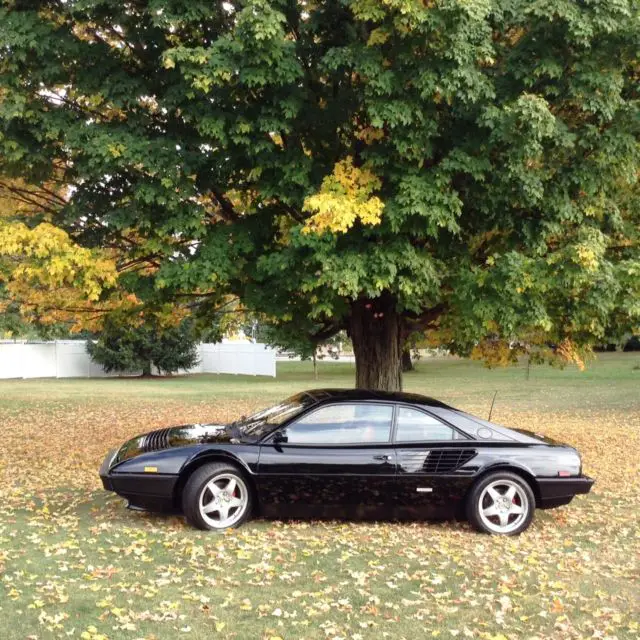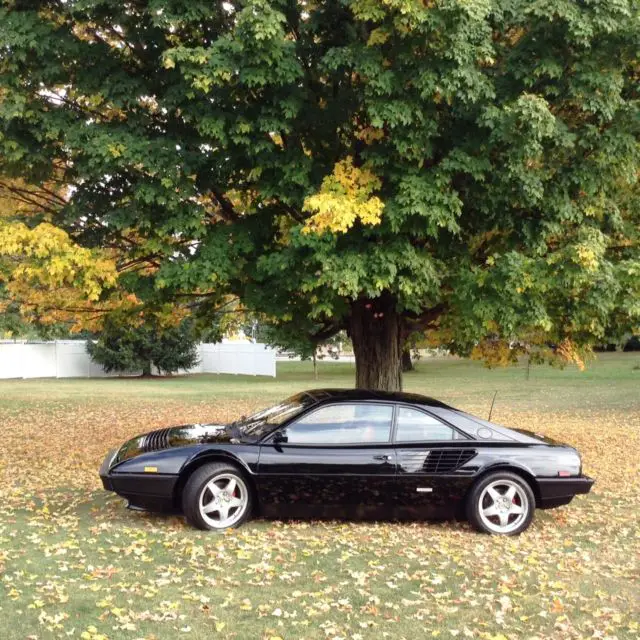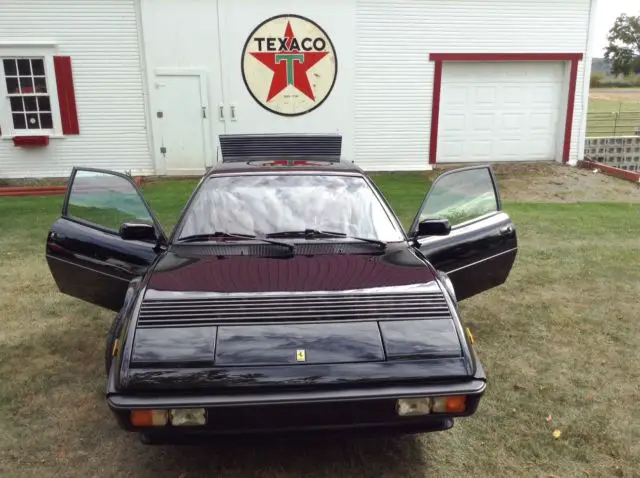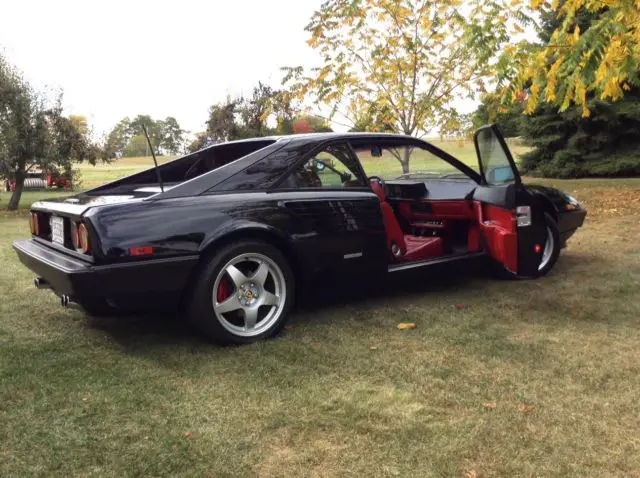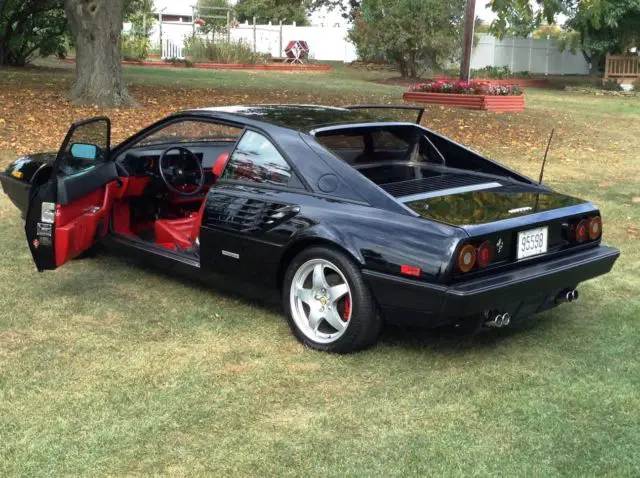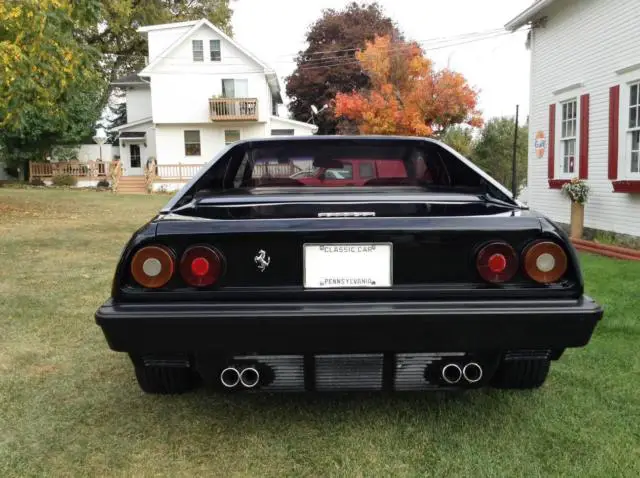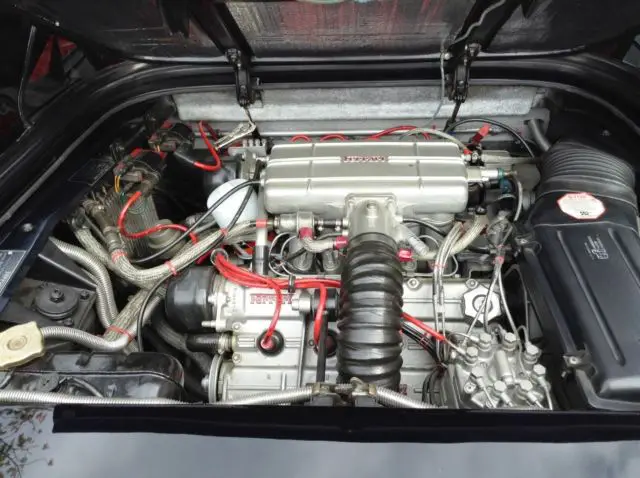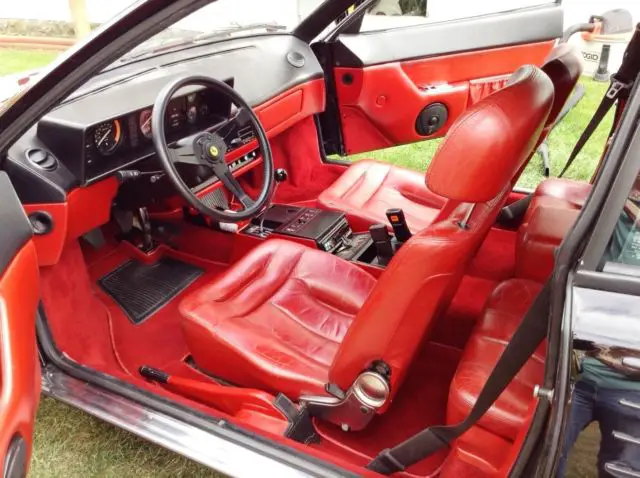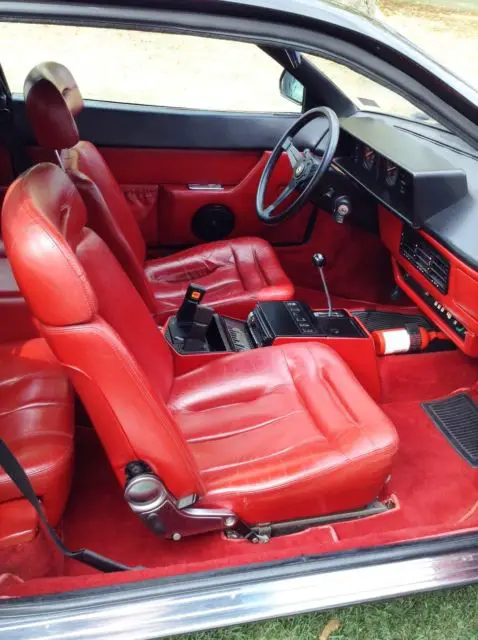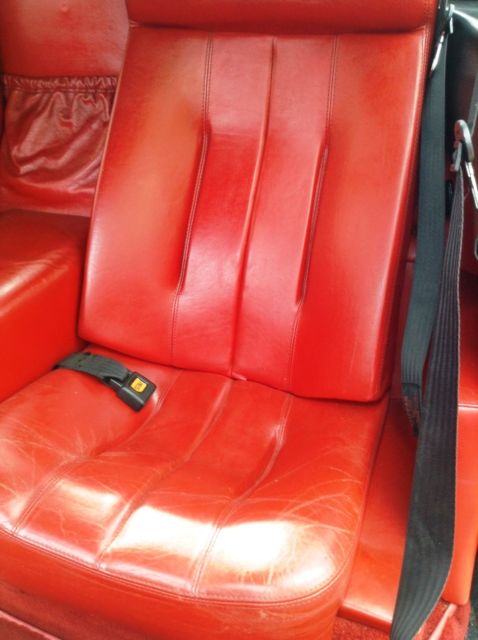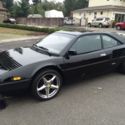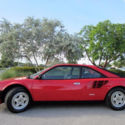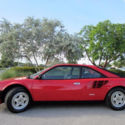1981 Ferrari Mondial 8 Coupe with 28,165 miles
| Make: | Ferrari |
| Model: | Mondial |
| Type: | Coupe |
| Trim: | 2-door coupe |
| Year: | 1981 |
| Mileage: | 28,165 |
| VIN: | ZFFAD08A5B0037443 |
| Color: | Black |
| Engine: | 2.9 liter V-8, 32 valve double overhead cam |
| Cylinders: | 8 |
| Fuel: | Gasoline |
| Transmission: | Manual |
| Drive type: | RWD |
| Interior color: | Red |
| Drive side: | Left-hand drive |
| Vehicle Title: | Clear |
| Item location: | Somerset, Pennsylvania, United States |
1981 Ferrari Mondial 2-door coupe Additional Info:
A brief History of the Ferrari Mondial 8
You are bidding on a 1981 Ferrari Mondial 8 coup with 28,165 miles on it. I bought the car in Philadelphia in July 2002, with 26,600 on the clock. In the three model years that this car was manufactured (1980-1983) only 708 of these models were made (of which only 147 were imported into the US). Further, the majority of these were cabriolets, making this hard top version a very rare (and frankly, better) car. The car had an MSRP of about $64,000 in 1981 dollars. The engine is a 2.9 liter V-8, 32 valve double overhead cam, with duel ignition, and K-Jetronic injection, producing around 214 horsepower. The engine is mounted mid-ship. Both the vented engine compartment lid and the front hood are aluminum, helping to keep the car’s center of gravity low. Top speed is reported to be 143 mph (I know from personal experience it will do 124 mph – no muss, no fuss).
The Mondial marked a few debuts for Ferrari. First, it was the first Ferrari with the entire engine/gearbox/rear suspension assembly built on a detachable steel sub-frame (similar to the design of their racing cars of that era). This design makes engine removal for a major rebuild or cylinder head removal much easier than it was on previous models. It also reduces maintenancecosts. Second, the conventional "H" shift pattern of the gearbox was ditched for one with the first gear situated in a "dog leg" down, to the left, and back, behind reverse. This pattern allowed quicker gear shifts between second and third gear and also between fourth and fifth. It is very easy to get used to, and one quickly realizes it is actually intuitive. The five-speed manual was the only gearbox offered on the Mondial 8, and this didn’t change until 1989, when the Mondial T received an automated manual.
The chassis is based on the 308 GT4, but it is longer and revised for improved handling. The suspension is the classic layout of unequal-length double wishbones and Koni dampers at all four corners. The steering is rack and pinion, while stopping power comes from 4 wheel vented disc brakes (and in the case of this particular car, sporting a beautiful bright red color, matching the interior).
Speaking of which, the Modial’s interior was a significant improvement over the 308 GT4. The dashboard ran deeper toward the floor, incorporated the(adjustable) steering column, and had a wrap-around design that went into the door panels. The instrument cluster section has the rectangular shape seen in other Ferraris of the 1980s and featured a new speedometer, tachometer, and a new array of buttons and switches. It was also offered in a two-tone design with the lower section matching the door panels, the upholstery, and the floor carpet, just as this car is fitted with its black and red interior. It all works very well aesthetically.
The Mondial is the most affordable way to become a Ferrari owner and thefour-seatconfiguration makes it a great Sunday driver for classic car enthusiasts with kids. It’s also affordable to maintain and, the fact that prices are continuing to climb, is a sign that the Mondial will soon get the recognition it well deserves and become a classic that will be wisely purchased as an investment too. Makes me laugh actually. Reminds me of my Porsche 914-6 which I always coveted as a teenager. Turns out the car I bought for $11,500 a few years ago is now bringing, in the right condition, $60,000 or better. I can see the same thing happening with these cars. But, I must part with several cars in my collection as I am moving and will simply not have the garage space I currently enjoy.
You can cut and paste this URL into your browser to check out current valuations: www.nadaguides.com/Classic-Cars/1981/Ferrari/Mondial-8/2-Door-Coupe/Values
This Particular Car
This particular car is representative of an exceptional example of the marque and model. Originally purchased in gray (ugh), I had the car repainted in black by a nationally recognized restoration shop that has done several cars in my collection. The black/red leather interior has been professionally re-dyed, and the combination of the bright red leather against the black exterior makes for a beautiful presentation. I cannot overstate how exquisite the paint on the car is – there are NO scratches, NO dents, and NO imperfections. Just a pure, deep, reflective black gloss on all surfaces. This will delight you.
New Pirelli P-zero tires coupled with the custom made (in England) Motorsport wheels not only update the look of the car, but also supply the sure-footed “slot car” type handling you are looking for. The car was mechanically sorted soon after purchase and includes a rebuilt alternator, power sunroof motor, and windshield washer pump. All the electrics were also sorted out and repaired/replaced as needed. The A/C was converted to the new 134a refrigerant, and a new A/C receiver and dryer were installed along with a new expansion valve and compressor belt.
The engine runs very smoothly. There is no smoke, no funny smells, no floor puddles, or other such drama. The Mondials are sometimes chided as being underpowered, but I believe that this is a relative concept. It physically has to do with HP to weight ratios, among other things of course, but I think cost is a psychological factor also – and this hurt the Mondial as it was more expensive (and not quite as fast) than say, the Porsche 928 or Lamborghini Jalpa of that era. My take – the 928 is a front wheel drive car, the Ferrari, a mid engine. The Ferrari has a red line of 7,800 rpms, and when you get this engine up on its cam (technically, cams), good things happen, quickly. You need to stay in the high rpm bands – you need to: Drive… The… Car. Get the gear box warmed up, and the classic gated shifter is slippery and perfect. The engine (sitting right behind your head) has tonal qualities that are simply musical. It took me a while to figure this out as I babied the car for the first several months of ownership. Once I got it though, it all made sense, and my cheeks would enviably hurt from smiling so much after a spirited drive. I am not saying that the Porsche is not a wonderful car (I own two of them). It just offers a different driving experience. And it is a Porsche, while the Ferrari is, well, a Ferrari. Two different camps entirely.
Sorry, I digress. The stereo has been upgraded to an Alpine 45 x 4 with a trunk mounted Kicker Impulse amp (KX 150.2), and Kicker KX 150.2 speakers. A new battery was installed in 2015.
The trunk of the car (behind the engine) was insulated and the original carpet re-installed (it got pretty hot there being so close to the engine). All steering and suspension components are solid and the car handles well. Very. Very. Well.
Sounds Great – Sign Me Up!
Not so fast Tonto. Let’s face facts: buying any car sight unseen via the internet can be a rather nerve-racking experience – especially an “exotic” such as a Ferrari. The car has some imperfections, which I will mention here in the spirit of full disclosure:
1) There is a very slow fluid leak in the reservoir that actuates the clutch. It is most likely a gasket. The reservoir for the clutch fluid is easily accessed via the front trunk, right next to the brake master cylinder. Since I owned the car, I would simply top it off with brake fluid in the spring, and then drive the car all Summer/Fall without issue. Frankly, at the rate it seeped, it just wasn’t worth my time to source and install the part – after all, who drives these cars in the winter?
2) The car was originally fitted with an electric antenna, the motor to which could not be rebuilt or sourced. You will need to supply a manual antenna if you desire to listen to the radio.
3) Despite my investment in the A/C unit, the car blew out a gasket between the high pressure Freon lines and the compressor. Again, really did not matter to me, although I did have it diagnosed. It is a common Behr compressor, so I imagine the gasket can be easily sourced and replaced – you will, of course, also need to recharge the system with new refrigerant.
4) In the 80’s, all the rage was to control all hoods, trunks, etc. with the (now) infamous piston-type mini-cylinders that would keep these access doors open. This car has five of them, all replaced by me when I bought it. It needs three to be replaced again; one in the rear trunk, and two that control the vented aluminum hood over the engine compartment. Don’t even think about ordering these from Ferrari. Source them from any dealer that sells RV’s and other sport/recreational equipment at a very reasonable cost. I have done the same for my 1987 Porsche 944 Turbo and I couldn’t be happier.
5) I want to make you aware of a problem with the sunroof. When I bought the car the sun roof panel would bang and slide around as you drove it. The first and only time I drove it in the rain….it leaked! As it turned out, it was missing the sun roof gasket! Of course, I had that replaced (and it no longer leaks). However, I now have an issue that, while the sun roof motor works just fine, the panel itself has a tendency to not clear the opening completely and it rubs against the inside of the roof itself, scratching the paint on the sunroof panel. After having it painted (again), I simply “pulled the plug” on the motor so that someone would not inadvertently try to open the sun roof. Turns out, while a sunroof was an option that could be checked off the order sheet when ordering the car, none of them were actually fitted at the Ferrari factory. Indeed, these orders were farmed out to a small specialty shop just a few miles from the Ferrari factory in Modena. This dilemma I will leave to you – I just quit using the sun roof.
6) There is no spare tire included with the car.
7) The car has a very small tear in the driver’s seat leather, buried deep within the crevice of the natural upholstery. You would never notice it unless I pointed it out, but, it is there and I have included a picture of it in the photos (see the photo with the nickel to understand the location and size). There also a very small chip in the black door pull where the paint did not adhere to the aluminum pull. The interior is in very nice condition, and is far superior to what you might consider commensurate with a car that is 37 years old. No cracks in the dash – no tears in the headliner, door panels, or elsewhere. The pictures speak for themselves. No apologies here.
There you go. That’s it. Hardly anything earth-shattering, but stuff you may (or may not) decide to deal with.
Included with the car is the original Blaupunkt radio, a car cover, and all receipts since my ownership. The car comes with a clean Pennsylvania title.
This car runs and handles great. It is not fragile by any means, and desires to be driven. It is also drop dead gorgeous!
Thank you for taking the time to read this rather long (but comprehensive) description of the car under your consideration. I would like to make myself available to answer any questions you might have, so my cell is area code 814, then 483, then 2662. Bid with confidence.
